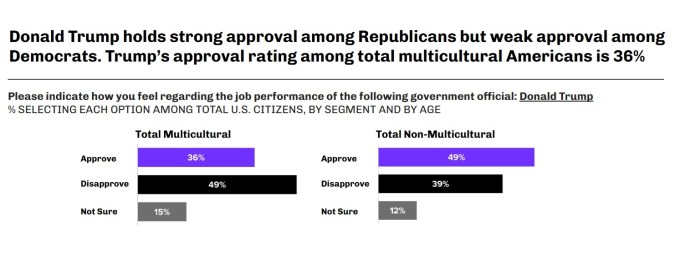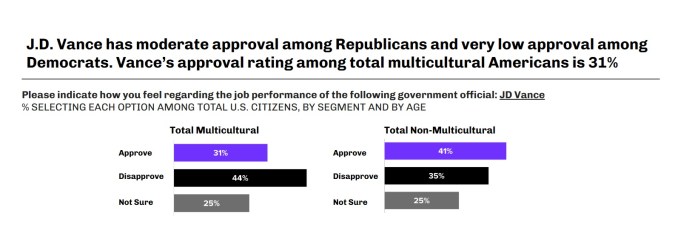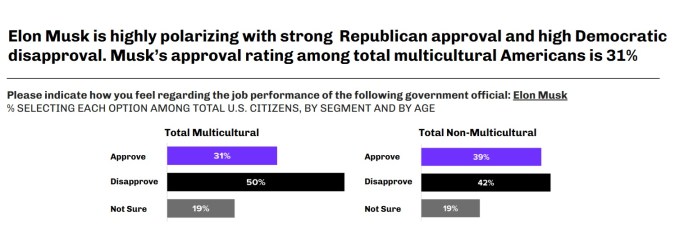Most multicultural voters, including Hispanics, disapprove of Trump, Vance, and Musk’s performances
A survey by My Code's Intelligence Center for La Opinión reveals disapproval of Trump, lack of knowledge about Vance, and division over Musk

Multimillinoaire Elon Musk, President Trump, and Vice President JD Vance. Crédito: Alex Brandon | AP
President Donald Trump surpasses Vice President JD Vance and multimillionaire Elon Musk on disapproval by multicultural voters.
While Vance disapproval reaches 41%, Trump gets 49%, and Musk 39%. But there is a key element, 25% of multicultural voters is “not sure” about Vance’s performance, according to a survey of the My Code’s Intelligence Center for La Opinión.
82% of multicultural Republicans approve of Trump’s performance, but the number plummets to 17% among the same group of Democratic voters. Also, 80% of non-multicultural Democratic voters disapprove of the President’s work.
There is a clear division among the openly LGBTQIA+ population; while 75% of the Democrats disapprove of Trump’s work, 73% of the Republicans approve of the President’s performance, even though federal orders to block transgender community from serving in the Army and to stop recognizing transgender people for benefits after Trump signed an Executive Order to recognize just two genders, male and female.
Just 36% of the multicultural population, including AAHPI, Black, and Hispanic approves Trump’s performance.
“Multicultural women of all ages are the least likely to approve of Donald Trump’s job performance”, the report says. The highest approval (33%) comes from women between 35-44 years, while women between 55-64 (19%) are less supportive of Trump’s work; close to that percentage (22%) is from young women between 19-24 years.

Younger multicultural men (under age 44) give Trump a higher approval rating (between 41% to 52%) than older multicultural men (45 and older), with 47% as average.
Trump’s approval numbers among multicultural voters are a surprise considering that many of the President’s policies affect them, such as the end of DEI (which affects education, labor, health, etc.), blocking transgender recognition, the prosecution of undocumented immigrants, even without a criminal record, shooting down the Department of Education (which creates many programs helping multicultural people) and so on.
But considering the answers of this population on other topics, including DEI and immigration, it seems the multicultural people are not fully aware of the new federal policies that can affect them directly.

Who knows J.D. Vance?
The My Code’s Intelligence Center survey results show that multicultural and non-multicultural voters do not know J.D. Vance’s work enough, as 25% answered they are “not sure” about the Vice President’s performance.
In total, just 31% of the multicultural approve of Vance’s work, while 44% disapprove; 41% of the non-multicultural population approve of his work, and 35% disapprove.
Among multicultural Republicans, 65% approve of Vance’s, which rises to 73% among non-multicultural Republicans.

Musk as a threat of national security
After making many decisions to cut or interfere with benefits and federal programs on Social Security, Education, USAID, IRS, and others, Elon Musk, leader of DOGE, faces criticism and some attacks on his brands, particularly Telsa.
The My Code’s Intelligence Center’s reflects that 48% of multicultural people disapprove of Musk’s involvement in the U.S. government, but 69% went beyond to think he is a national security threat to the country.
Talking just about Musk’s performance, 50% of the multicultural population disapprove of him, while 37% supports his work.
The multimillionaire’s work is also disapproved by 42% of non-multicultural people, while 39% support him.
19% of survey participants were “not sure” about Musk’s performance.
What are voters’ concerns?
There is a difference regarding issues that impact multicultural men and women.
U.S. women
– Reproductive health care: 49%
– Cost of everyday goods: 32%
– Childcare affordability: 32%
– Domestic violence: 31%
– Mental health and societal pressures 28%
U.S. men
– Financial stability 45%
– Mental health 41%
– Job security 38%
– The cost of everyday goods 34%
– Family responsibilities 32%





